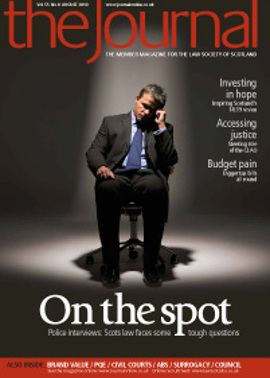From Cadder to Calman via Constitution

Considering Cadder
The first signs of summer ending are upon us, with the shops full of back-to-school products, Scottish football teams heading for the exit from Europe before the domestic season has started, and Council considering the practising certificate fee at its meeting on 6 August for recommendation to the SGM in September.
As expected, July proved to be a busy month, with continued work on the implications of the Cadder appeal and the associated Crown Office Guidelines on interviewing suspects, the Society’s consultation on its constitution and standing orders, the Legal Services (Scotland) Bill proposals and other important issues.
Considerable effort has been devoted to providing support, advice and professional practice guidance to criminal practitioners concerned about the implications of Cadder. At the same time, meetings with the Crown Office, Scottish Government and Scottish Legal Aid Board have considered longer-term issues which may arise once a decision in the case is issued.
The Professional Practice, Criminal Law and Legal Aid Committees and the team at the Society deserve particular credit for their close co-operation and determination to support the profession in the many facets arising from this case and its effects. Special thanks are also due to the Legal Aid Negotiating Team who, despite professional commitments and well-deserved holidays, maintained a seamless representation of members’ interests, and also to those members who have provided helpful feedback and input to the discussions at a number of meetings.
Commitments on the bill
Discussions have also been held with the Scottish Government on various measures in the Legal Services (Scotland) Bill. A number of amendments promoted by the Society were incorporated at stage 2 of the parliamentary process, and the Minister for Community Safety, Fergus Ewing, gave a commitment during sessions of the Justice Committee to consider further several outstanding issues raised by the Society, including the basis of access to the Guarantee Fund for licensed providers, giving the Society the power to suspend practising certificates in certain circumstances, and the operation of the Scottish Solicitors’ Discipline Tribunal. Those talks and reports on progress to the profession will continue over the summer.
Constitution matters
The six-week consultation on the Society’s constitution and standing orders closed towards the end of July.
There were thoughtful and constructive comments in the responses received which will be carefully considered by the Council to agree a number of guiding principles which will be used to develop the next version of the drafts.
If the Society is to become a regulator of new licensed legal services providers, which has the backing of the profession, it must have a modern constitution and an effective Council. Equally, the Society must operate democratically and with transparency, accountability and efficiency – all of which will be uppermost in the minds of Council members as they move forward to the next stage. The final decisions, of course, will remain with the Society’s members in General Meeting.
Constitutional arrangements were also on the Scotland Office agenda at the end of July, when Lorna Jack and I attended a briefing on the implementation of the recommendations of the Calman Commission on Scottish Devolution.
The Society previously provided detailed written and oral evidence to the Commission, with a significant number of its proposals taken on board. The Society’s significant input and involvement in the earlier stages has led to Director of Law Reform, Michael Clancy, being invited to sit on the Calman Implementation Group. With such major constitutional change taking place, these are exciting times for Scotland.
Watching the numbers
The annual influx of new training contracts to the Society begins this month and, although the number of places is unlikely to match the record numbers in 2006 and 2007, we will monitor numbers of trainees with interest to help to gauge the extent of the economic recovery and return of business confidence of the profession. Likewise, the Society will monitor the level of newly qualified solicitors who are unable to secure jobs at the end of their training contracts so that we can offer support and assistance where needed. Hopefully, the signs will be positive.
In this issue
- From Cadder to Calman via Constitution
- We can make the bill work
- The Cadder effect
- Bio Quarter: a case study
- Budgets of many colours
- Been there, done that
- Gill and the consumer
- Smoothing the path
- Net yourself a baby
- What's in a name?
- Inspiring change
- Further work in hand on constitution
- Faculty support on the agenda
- PCC's first year of "unsatisfactory" complaints
- From the Brussels office
- Learning in context
- Paper, pixel and process
- Growing cloud
- Ask Ash
- PQE: Post Qualification Equality?
- Technology to the rescue?
- "Definitive" approach
- Threat, or opportunity?
- Equality for all?
- Time to take a stand?
- A burden discharged
- The promise of certainty?
- A future for crofting
- Final tally
- Website review
- Book reviews
- An easy way to give?
- Three cheers for iPad






